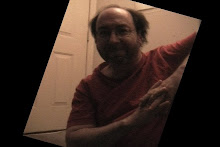Overcome by the guilt that can only come from being a major influence here and there on Will Ferrell yet not seeing his movies until they come to premium cable channels and even then sometimes not seeing them immediately (this does not include movies that involve Stuart Cornfeld and Will Ferrell, I will always go see Cornfeld movies as soon as they come out in theatres), this time around I saw a Will Ferrell movie on the first day it appeared on a premium cable channel. I refer to "Step Brothers," which was made available for viewing on Starz On Demand Early Premieres today for the first time.
I will not write a movie review, however, I do feel compelled to say that I consider this movie to be truly original for the particular brand of absurdity in its premise, the specific unreality that permeates its characters and what they are capable of. I also see that it is highly unlikely that this movie will ever really be recognized for its originality, but will instead always be the target of tired, cliched criticism by those among us who are presumed adult and serious. Some will feel generous to grant that it is an "anything goes" slapstick comedy, however, I see significant creativity beneath the unreality, not unlike the way I believe the scifi "Twilight Zone" premises illuminate more truthful, insightful revelations regarding human emotions and the soul than do the so-called real premise upon which serious Chuck Norris-type characters dwell.
In this movie Will Ferrell continues his tradition of frequently being influenced by me in a big way. Back when I saw his small part in the first Austin Powers movie ("Austin Powers: International Man of Mystery," 1997), Will Ferrell's character performed an action I perceived as being based on my 1978 video, "How Did The Future Learn To Play Monopoly".
In my 1978 video, set in a relatively primitive future, a prisoner is brought before the king, refusing to divulge how to play Monopoly. The king has a whole Monopoly game, and the prisoner is the only remaining man alive who knows how to play Monopoly. Yet as if having learned a lesson from Prometheus, the Greek mythological character who gave fire to man, the prisoner will not be responsible for corrupting the human race. Alright, I was making a metaphorical statement about the very seed of capitalism. However, the prisoner's great feeling of repugnance at the thought of bringing knowledge of Monopoly back into the world did not necessarily represent my personal views on economic systems. I wanted to show how the seed of something that can be pervasively superimposed over everyone's life can exist in such sheep-like clothing - unless one sees my choice of Monopoly as random, the prisoner character's extreme feelings towards it totally absurd. My video obviously suggests a backstory to his aversion, yet leaves you to guess about it. And now back to the story: Next, everyone around the king begins to chant, like children who know the power of acting as one, "We wanna play Monopoly! We wanna play Monopoly! We wanna play Monopoly!" The prisoner finally cannot stand it, blurting out that if they will just stop torturing him with their chanting in this way he will give in and teach them how to play Monopoly. And so he does.
In the 1997 "Austin Powers" movie, Ferrell's scene is similar, where the childish, repetitious chanting of something humorously produces the effect of forcing a character's desired capitulation. One might also note that the premise of "Austin Powers" involves an individual who is something of a singular remnant of a bygone era, or at least the only one who hasn't moved beyond it, and is at one with ways that others are now outsiders to, despite there having once been a time when many were a part of the grooviness. This gives Powers much in common with the only remaining survivor from among all who knew the secret of how to play Monopoly. To be totally convinced of my influence on the Ferrell character in that movie, you might also need to be familiar with how often people such as Mike Myers et al are influenced by me.
And so, when years and years later Ferrell made his YouTube surprise hit videos with the very, very little girl Pearl, "Landlord" and "Good Cop, Bad Cop," wherein the ability of a small child to be ultra-insistent and unyielding (childish, to be precise) pitted against an adult prove far too powerful for the adult to be able to hold his ground, I was already on that page with regard to Will Ferrell. In fact, "Good Cop, Bad Cop" even has the Ferrell character divulging his great secret to the very, very little girl, Pearl (she interrogates a murder confession out of him). This would have reminded me of "How Did The Future Learn To Play Monopoly" even if Ferrell in "Austin Powers" had not.
This thing about children encapsulates much of what "Step Brothers" is about, the power of childishness to dominate adult situations in so big a way, something one could liken to David and Goliath, in that one seemingly powerful is actually no match against one who appears comparatively weak. This idea is more specifically focused on when we see the schoolchildren are able to so completely overcome the two adult stepbrothers.
The filmmakers seem to share my perception that the stepbrothers in relation to the schoolchildren epitomizes something at the core of the movie, for the final scene of the movie is their return match, offering the moviegoer a way to crystalize on the growth of the stepbrothers - absurdist growth, of course.
Subscribe to:
Post Comments (Atom)


No comments:
Post a Comment